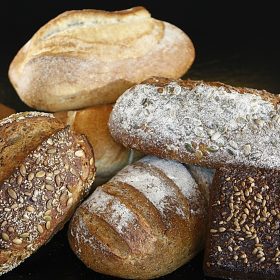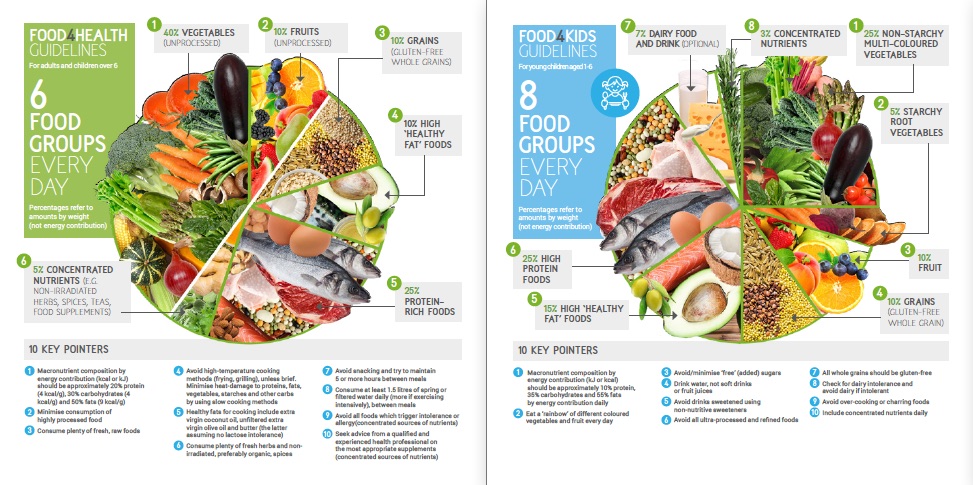Content Sections
Rob Verkerk PhD
Over the last week the media in the UK, US and elsewhere has been full of news about ‘faddish’ gluten-free diets contributing to an increased risk of type 2 diabetes. At ANH-Intl, we dig below the surface to find out what’s really going on — then we tell you what we've found.

So we dug.
And we found.
Not very much.
That substantiated the news reports.
Behind the scenes of the new Harvard analysis
The ‘new study’ that was referenced in the news reports wasn't really a new study at all. It was a re-analysis of three retrospective cohort studies in the US by the Harvard nutrition group, including Dr Walter Willett. Dr Willett is regarded by many as the world’s most acclaimed and influential nutritional researcher.
The three studies, the Nurses’ Health Study I and II (started in 1976) and the Health Professionals Follow-Up Study (started in 1986) are among the longest and largest follow-up, cohort studies on risk factors linked to chronic diseases ever conducted.
Among the many factors looked at are nutritional patterns and health outcomes among the various cohorts of nurses, doctors and other health professionals. As the studies are so long established, many subjects continue to die, while new ones are recruited. Somewhat morbidly, the dead give Willett and his co-workers increasing amounts of data to crunch once their causes of death have been made available.
Nearly all of Willett’s conclusions over the years are drawn from studying data relationships found within these studies. That’s, it could be argued, no bad thing given the likely reliability of the questionnaire data collected on eating, drug intake or lifestyle habits. The subjects are after all health professionals, so one might expect reliability to be greater than for the general public. But perhaps we shouldn’t assume, given what we know of the peculiarities of human psychology around food, alcohol, smoking, physical activity and other aspects of lifestyle.

Probably most well-known of Willett’s findings is the link between red meat consumption and the increased risk of chronic diseases like heart disease and cancer. Willett has also been a big proponent of whole grains, fibre and nuts, these, say his studies, appearing to have protective effects against chronic disease. He’s been, as well, a protagonist of low fat, Mediterranean diets.

All good so far.
The Harvard gluten study
First, there is no peer-reviewed, published research study as such. There is only an abstract in a journal of the American Heart Association (AHA) 'Circulation'. The paper was delivered by lead author Geng Zong PhD as part of an AHA meeting on 9 March.
The AHA also put out a press release, which most of the media relied on for their reporting. The fact that there is only an abstract available means there are limited data on which to do any kind of detailed critique of the science. But there is enough there to understand just how distant the headlines are from what Zong, Willett and co found.
Entirely missed by the press, for example, is that there would not have been any of the typical peer review required for a complete research paper. Or that gluten-free diets were not looked at in any shape or size at all.

Secondly, let’s not forget the studies on which the gluten and type 2 diabetes data are drawn are observational studies that have been running 30 plus years. There are no actual measures of gluten, just estimates based on what study participants said they were eating based on questionnaires they completed. For the majority of the study period, there was very little in the way of certified gluten-free food. There was also much less gluten awareness than there has been in recent years. Zong et al simply made estimates of gluten based on typical amounts in carbohydrate sources, mostly refined ones, like “pastas, cereals, pizza, muffins, pretzels, and bread.”

What the researchers found was nevertheless interesting — and that’s what triggered the media frenzy. Once adjustments had been made for ethnicity, family history of diabetes, smoking status, alcohol intake, physical activity, menopausal status, hormone drug use, multivitamin use and total energy intake (see legend at base of table in abstract), the participants who consumed the least gluten had a 13 per cent greater risk of developing type 2 diabetes than those who consumed the most. Thirteen percent.
That’s not a big percentage difference, but based on the fact that the data were drawn from 200,000 people, it’s quite statistically significant. Without more data, we have to ask what factors, other than, or in addition to gluten, might contribute to this effect? Most importantly, could there be other factors that act as confounders for which adjustments haven’t been made?
We say, absolutely! The authors indicate in their abstract that “the associations were slightly attenuated after further adjusting for cereal fiber, but not other carbohydrate components.” OK, we know that cereal fibre is protective – it’s after all one of Willett’s major findings from these ongoing cohort studies.
Since refined carbohydrate intake was the primary measure by which gluten was estimated, for people who consumed less refined carbs, and therefore less gluten, how were they making up their energy deficit? Well, data analysed by the epidemiology group at Harvard School of Public Health tells us that increased intake of red meat, and especially processed meats, is directly related to a greater risk of type 2 diabetes!

In 2010, a meta-analysis by these researchers that considered 1.2 million subjects showed that consuming processed meat – but not unprocessed red meat – contributes to a 19% increased risk of type 2 diabetes. Nineteen percent. An update of the science by the same group showed that a major part of this effect may be linked to sodium content.
Coming back to Zong’s gluten study, the authors don’t appear to have made any adjustments for either red meat, processed meat or sodium intake. There are also other possible confounders that haven’t been taken into account from what we can see in the abstract. For instance, what about essential fatty acid profile (e.g. Omega 6:3 ratio) and trans fat intake that could have been different among those consuming less refined carbs, further influencing the diabetes risk?
We suggest there is a high likelihood that the observed trend for lower refined carbohydrate (and estimated gluten) intake giving rise to increased type 2 diabetes risk is linked to changes in nutrient composition and/or eating frequency that have not been accounted for. It is way too early to be shouting this from the rooftops to the public – and this view on refined carbohydrate intake vs diabetes risk runs completely contrary to a large and increasing body of evidence and clinical experience.
Crucially, the opening words of the abstract, “Gluten-free diets have grown in popularity, but evidence is lacking regarding gluten intake and long-term health” might suggest the study was investigating gluten-free diets. That’s what the media thought too. The answer is a very clear ‘no’.

We did a little calculation to put this into perspective. If you take the lowest intakes of gluten consumed by participants in the 3 cohort studies (i.e. two standard deviations below the mean intake which would account for over 95% of the all subjects), you get to a gluten consumption figure of around 130,000 ppm gluten in the equivalent of 4 wholemeal slices of bread. That compares with the need to be below 20 ppm gluten for a gluten-free diet. Put another way, the lowest gluten level was around 6,500 times greater than that required for a gluten-free diet!
Conclusion: the study, despite all the headlines, did not even begin to assess the impact of a gluten-free diet on type 2 diabetes risk!
What the study did do, however, is give Walter Willett and associates, along with the American Heart Foundation — seen as a champion of none other than General Mills — some extra mileage to go out and tell people what the Harvard nutrition group have been preaching for years, ‘go forth and eat your wholemeal and cereal fibre’.
What the Harvard researchers can’t tell us, based on the data that Dr Zong discussed last week, is what happens if we go gluten-free, or very-low gluten (i.e. grains containing less than 100 ppm gluten).
This is when researchers need to talk to clinicians. There are thousands of clinicians out there, especially practitioners of functional medicine, with patients and clients who have experienced staggering results when they come off gluten-containing grains altogether.
These practitioners are not playing around with diets containing 130,000 pm refined carbohydrates. They are properly gluten-free! If grains are used they are less than 20 ppm. Or grains are entirely excluded from the diet.
The Food4Health guidelines represent just such a gluten-free approach, and supporting references can be found here.

Bottom line
Based on our evaluation of Zong’s abstract, and the very clear misrepresentation of it by a media keen to label gluten free as a fad diet, despite it having been the norm for over 97% of human evolutionary timescale, we draw the following overall conclusions:
- The apparent association between diets lower in gluten and an increased type 2 diabetes risk was not in any way causally linked to gluten. There are significant factors such as processed meat intake consumption, which are strongly associated, and these potential confounding factors were not adjusted for.
- This means that the reported effect, consumption of greater amounts of refined carbohydrate contributing to a protective effect against type 2 diabetes was likely an artefact of the study caused by changes in overall composition or nutritional profile and/or food frequency when people cut back on refined carbs.
- The analysis in no way attempted to (or could) look at a gluten-free diet making an utter nonsense of the media headlines linked to this study around the world. Gluten-free diets can of course be high glycaemic, unbalanced and unhealthy. That is not the point. What we need is better research on the effect of healthy balanced diets that also happen to be free of gluten.
Presently there is no such research – only a large amount of supporting scientific evidence on the benefit of going gluten free among a significant proportion of the population with non-coeliac gluten sensitivity (NCGS), potent scientific justifications and a gamut of very promising clinical experience!
Back to Food4Health campaign








Comments
your voice counts
16 March 2017 at 12:59 pm
When I was told I needed to change to a gluten free diet I was warned of the danger of increasing my risk of diabetes because of the high sugar content of many GF processed foods. My experience of GF products available in supermarkets bears this out.
Going gluten free changed my life for the better so I have had no difficulty in keeping to it despite any inconvenience. I only allow myself an unhealthy treat such as a GF biscuit once in a while. I wish more GF products were healthy - lower in salt and sugar. It is not always possible to cook from scratch although I usually do.
16 March 2017 at 5:32 pm
Thanks for taking the time to comment Cheryl.
Warm Regards
Melissa
16 March 2017 at 1:43 pm
If the people following a "gluten-free" diet were actually eating lots of gluten-free products from manufacturers who have jumped onto this particular "gravy train" you have your answer. These products are made from multiple highly refined grains which do not contain gluten together with many additives to make them taste half way reasonable. Most of them should be classed as nutrient-deficient junk food.
21 March 2017 at 8:22 am
I feel so much better now I don't eat gluten. I want to spread the word to my family and friends but I have apparently become a diet bore. It is articles like this trying to discredit, like you say a diet that has been the 'norm for over 97% of evolutionary timescale' that my friend throw back at me.
The food industry has become too big, foods containing gluten are offered on every street corner. I know I will never go back to eating gluten, it's an upward battle but I know it's one that will win.
25 March 2017 at 2:28 pm
Speed-reading through this article is probably the reason why I haven't found true justification for GF being behind T2D. I've read that India's population is amongst the world's highest for sufferers of the disease, but this can be attributed to extremely high levels of saturated fat & refined sugary, desserts or a combination of saturated fat & sugar in recipes, which feature prominently in foods most meals are composed of, rather than consumption of excessive amounts of grain-based products. Cooking methods like frying in rancid fat & over-cooking veg on high heat are possibly also causative factors.
26 January 2019 at 10:12 pm
hi, i have found that avoiding wheat products ( and presumably gluten) has given me much more energy, particularly for hill walking. On the rare occasion i have eaten wheat, the next day i feel drained and often breathless with aching legs when out walking. So personally doing without is the best thing ever.
Your voice counts
We welcome your comments and are very interested in your point of view, but we ask that you keep them relevant to the article, that they be civil and without commercial links. All comments are moderated prior to being published. We reserve the right to edit or not publish comments that we consider abusive or offensive.
There is extra content here from a third party provider. You will be unable to see this content unless you agree to allow Content Cookies. Cookie Preferences